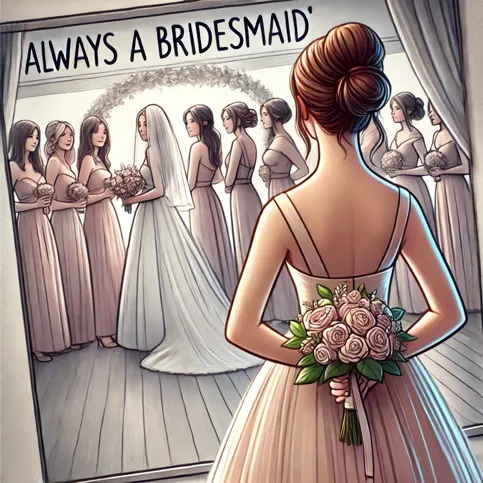What is the meaning of the phrase ‘always a bridesmaid never a bride’?
Describing someone who frequently comes close to achieving a significant goal but never quite reaches it. (Such as someone who is often a bridesmaid, but never a bride.)
What is the origin of the phrase ‘always a bridesmaid never a bride’?
The phrase ‘often a bridesmaid never a bride’ saw its first use as a line in ‘Why an I always a bridesmaid’ a Victorian English Music Hall song written by Charles Collins and Fred. W. Leigh in the year 1917, and sung by Lily Morris. But this was not when the phrase became popularised. That came 8 years later when the song was used for an advertising campaign in the United States.
Perhaps surprisingly, it wasn;t a bridal boutique that launched the campaign, but the mouthwash brand Listerine. They launched a series of adverts bearing the slogan ‘often a bridesmaid, never a bride’ in the year 1924.
The campaign by Listerine coined the term ‘halitosis’ for bad breath. The star of their adverts was the character ‘Edna’ who was dubbed ‘often a bridesmaid, but never a bride’. Listerine played heavily on the fears people (particularly women) may have if they failed to treat their terrible halitosis by using their now famous mouthwash.
Since its use here, while it is still mainly used to refer to bridesmaids, has now expanded to include anyone who frequently comes close to achieving a significant goal but never quite reaches it.
What are some notable uses of the phrase ‘always a bridesmaid never a bride’?
The phrase ‘always a bridesmaid never a bride’ frequently appears in film and TV, for instance in the hit US TV show ‘Friends’ and is central to the plot in the romcom ‘27 Dresses’.
There was also a song called “Always a Bridesmaid, Never a Bride” by Mike Gayle released in 1998. More recently the novel “Bridesmaids” by Jane Costello published in 2011 uses the concept to explore the lives of women who are often bridesmaids but not brides.

